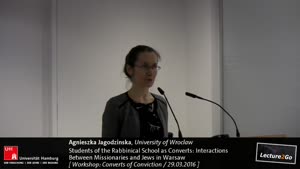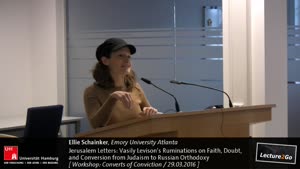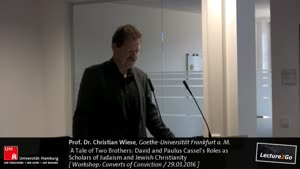A Tale of Two brothers: David and Paulus Cassel's Roles as Scholars of Judaism and Jewish Christianity - Prof. Dr. Christian Wiese - University of Hamburg
- Lecture2Go
- Catalog
- F.5 - Geisteswissenschaften
- Philosophie
- Converts of Conviction
Catalog
A Tale of Two brothers: David and Paulus Cassel's Roles as Scholars of Judaism and Jewish Christianity
FAITH AND SCEPTICISM IN NINETEENTH CENTURY EUROPEAN JEWISH SOCIETY
The study of Jewish converts to Christianity in the modern era has not always been a favorite subject of Jewish historiography. Labeled disparagingly in the Jewish tradition as meshumadim [apostates], many earlier Jewish scholars treated them in a negative light or generally ignored them as not properly belonging any longer to the community and its historical legacy. This situation has radically changed in recent years with an outpouring of new studies on converts in variegated times and places, culminating perhaps in the most recent synthesis of Todd Endelman, one of the pioneers in the study of converts in the modern era.
While Endelman argues that most modern converts left the Jewish fold for economic, social, or political reasons, he does acknowledge the presence of those who chose to convert for ideological and spiritual reasons. The purpose of our workshop is to consider the latter group, perhaps the most interesting from the perspective of Jewish intellectual history, those who moved from Judaism to Christianity out of a conviction that they were choosing a superior faith, and out of doubt or lack of confidence in the religious principles and practices of their former one. Their spiritual journeys often led them to doubt their newly adopted faiths as well, and some even returned to Judaism or adopted a hybrid faith consisting of elements of both religions. Their intellectual itineraries between Judaism and Christianity offer a unique perspective on the formation of modern Jewish identities, Jewish-Christian relations, and the history of Jewish sceptical postures.
The papers in this workshop offer four case studies of converts in four distinct localities: Germany, Russia, Poland, and England, but all living in the nineteenth- century. It is our hope that these contributions and the conversation they will generate will contribute to a deeper understanding of the variety of convert experiences in the modern era and their significance to the history of Jewish thought.
---
FAITH AND SCEPTICISM IN NINETEENTH CENTURY EUROPEAN JEWISH SOCIETY
The study of Jewish converts to Christianity in the modern era has not always been a favorite subject of Jewish historiography. Labeled disparagingly in the Jewish tradition as meshumadim [apostates], many earlier Jewish scholars treated them in a negative light or generally ignored them as not properly belonging any longer to the community and its historical legacy. This situation has radically changed in recent years with an outpouring of new studies on converts in variegated times and places, culminating perhaps in the most recent synthesis of Todd Endelman, one of the pioneers in the study of converts in the modern era.
While Endelman argues that most modern converts left the Jewish fold for economic, social, or political reasons, he does acknowledge the presence of those who chose to convert for ideological and spiritual reasons. The purpose of our workshop is to consider the latter group, perhaps the most interesting from the perspective of Jewish intellectual history, those who moved from Judaism to Christianity out of a conviction that they were choosing a superior faith, and out of doubt or lack of confidence in the religious principles and practices of their former one. Their spiritual journeys often led them to doubt their newly adopted faiths as well, and some even returned to Judaism or adopted a hybrid faith consisting of elements of both religions. Their intellectual itineraries between Judaism and Christianity offer a unique perspective on the formation of modern Jewish identities, Jewish-Christian relations, and the history of Jewish sceptical postures.
The papers in this workshop offer four case studies of converts in four distinct localities: Germany, Russia, Poland, and England, but all living in the nineteenth- century. It is our hope that these contributions and the conversation they will generate will contribute to a deeper understanding of the variety of convert experiences in the modern era and their significance to the history of Jewish thought.




